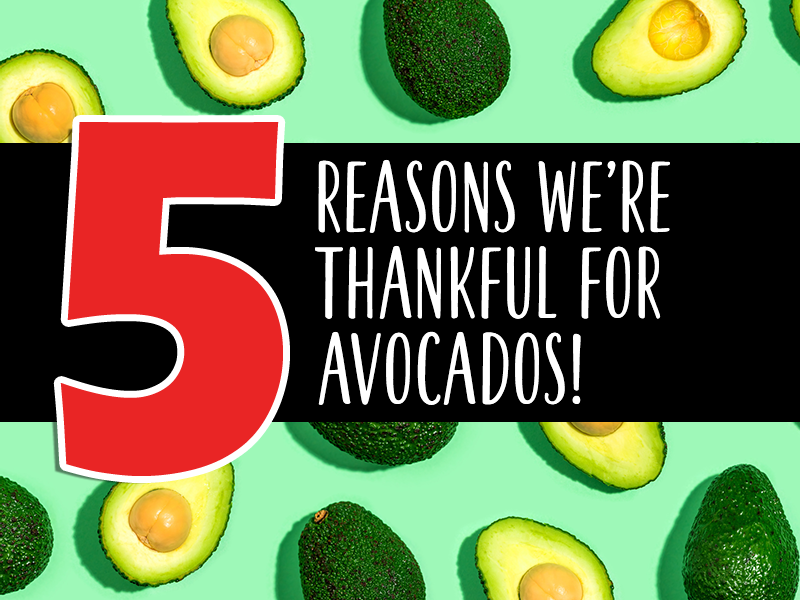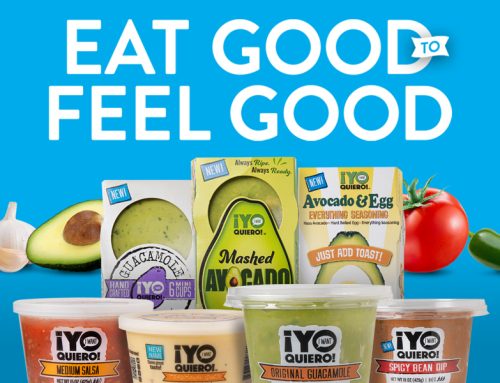5 Reasons We’re Thankful for Avocado

This may come as a surprise but in the ¡Yo Quiero! family, when we sit down at our dip-covered table and begin to think about all that we are thankful for, there is usually one commonality between us all. The avocado.
Below we break down five reasons we are thankful for what we feel is the most extraordinary fruit in the world, avocado!
- Healthy Fats
More often than not, when people think about fat, it’s in a negative connotation, but did you know there are good kinds of fat? For example, monounsaturated and polyunsaturated fats found in avocados are often called “good fats.” In addition, avocado consumption has been linked to lower harmful (LDL) cholesterol levels. In fact, a recent study suggests an avocado per day can keep bad cholesterol at bay for overweight and obese individuals.
According to heart.org, the four types have different chemical structures and physical properties. The “bad fats,” saturated and trans fats, tend to be more solid at room temperature (like butter). Monounsaturated and polyunsaturated fats tend to be more liquid (like canola oil).
Fats can also have different effects on the cholesterol levels in your body. A diet of high saturated fats and trans fats raise bad cholesterol (LDL) levels in your blood. Conversely, a healthy dietary pattern higher in monounsaturated and polyunsaturated fats can lower bad cholesterol levels.
- Nutrients
Avocados are a great source of nutrients, including:
- Folate
- Magnesium
- Potassium
- Riboflavin (Vitamin B2)
- Niacin (Vitamin B3)
- Pantothenic Acid (Vitamin B5)
- Pyridoxine (Vitamin B6)
- Vitamin C
- Vitamin E
- Vitamin K
You probably won’t be surprised to know that you can’t use the nutrients you eat unless your body can absorb and utilize them. Avocados also help with this.
For starters, they serve as a direct delivery system. Some vitamins, such as vitamin E, are especially beneficial to obtain directly from food because they do not absorb as well when taken as supplements.
Second, avocados aid in the absorption of fat-soluble nutrients such as vitamins A, D, E, and K. When selecting foods high in these nutrients, a little avocado can help your body retain them.
- Fiber
High-fiber diets have been praised for their ability to lower blood sugar, lower cholesterol, and possibly prevent certain types of cancer, such as colon cancer. The recommended daily fiber intake for women is 25 grams per day and 35 grams for men, but most of us fall short of those targets. Avocados provide 3 grams of dietary fiber for every serving (1/3 medium avocado). So, if you eat a serving of avocado at breakfast, lunch, and dinner, you’ll boost your daily fiber intake by 9 grams.
- Vision
According to Medical News Today, avocados contain lutein and zeaxanthin, two phytochemicals present in eye tissue. They provide antioxidant protection to help minimize damage, including from UV light.
The monounsaturated fatty acids in avocados also support the absorption of other beneficial fat-soluble antioxidants, such as beta-carotene. As a result, adding avocados to the diet may help reduce the risk of developing age-related macular degeneration.
- Taste
Last but certainly not least, is that avocados taste great! The delicious and versatile fruit is good on almost anything and provides several under-consumed nutrients by contributing nearly 20 vitamins and minerals to your diet in a single serving.



